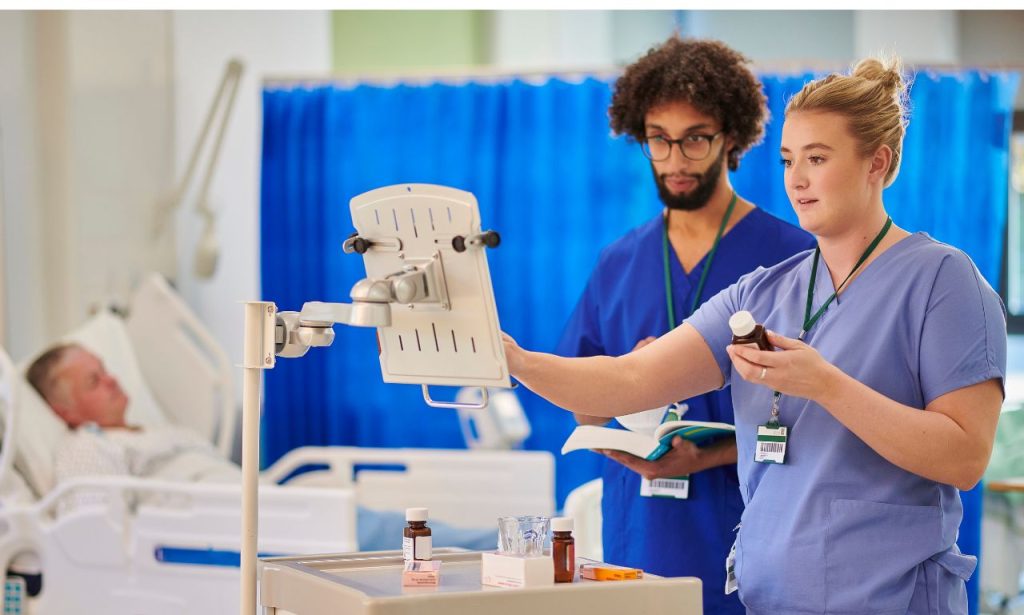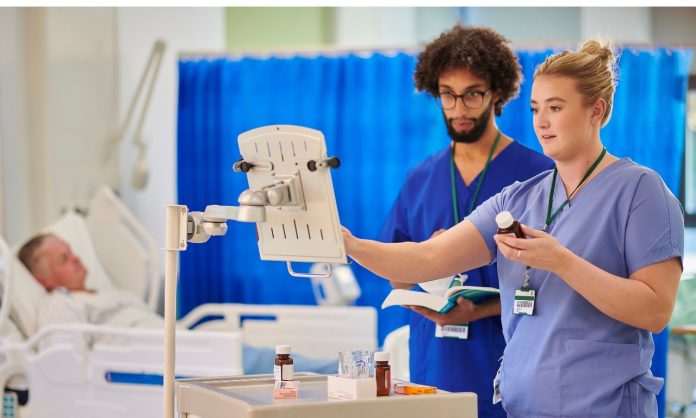Stepping into a nursing home can feel like walking into a space filled with compassion and community care. Among the hustle of licensed nurses, nursing aides, and caregivers, there’s a role that stands out for its responsibility in handling medications and supporting resident health. So, what is a Med Tech in a nursing home? A Med Tech, or Medication Technician, is the linchpin that ensures medications are administered with precision, care, and empathy.
In this article, we dive deep into the critical role Med Techs play in nursing homes—from their daily responsibilities to educational paths, salary expectations, and their influence on residents’ well-being. By understanding what is a Med Tech in a nursing home, we can appreciate the vital role they play in providing quality care to residents.
Role and Responsibilities of a Med Tech

What is a Med Tech in a nursing home without understanding their core responsibilities? Med Techs are unsung heroes in nursing homes and assisted living settings. They bridge the gap between residents and proper medication management, ensuring the best care possible.
Daily Activities and Support
Med Techs start their day early, making sure everything runs smoothly. Their tasks are meticulous, focusing on improving the quality of care for residents. Here’s what they typically do:
- Administer Medications: Med Techs oversee the administration of medication to residents, including oral medications, injections, and as-needed medications, making sure each resident gets the right dose at the right time.
- Monitor Vital Signs: Blood pressure checks, pulse rate, and blood glucose tests are standard tasks. These monitoring activities help detect early changes in residents’ conditions and assist in managing chronic conditions.
- Daily Documentation: Every medication given, every observation made—it all goes in the daily logbook. This documentation ensures there’s no confusion about medications to residents and supports healthcare professionals to act promptly when necessary.
Monitoring Vital Signs
- Blood Pressure Checks: Blood pressure monitoring helps identify sudden changes that may require immediate medical attention.
- Blood-Glucose Level Checks: Crucial for residents with diabetes, blood-glucose tests help manage chronic conditions and prevent adverse drug events.
Managing Medications
The primary role of a Med Tech in a nursing home involves managing medications.
- Medication Administration: Med Techs are responsible for the administration of medication, ensuring adherence to the “rights of medication administration” — right patient, right dose, right medication, right time, and right route.
- Audit Medication Carts: They regularly audit medication carts to ensure all medications are available and nothing is expired or misplaced.
- Forms of Medication: Med Techs handle various forms of medication—oral, injectable, and topical—ensuring proper administration in line with healthcare provider instructions.
Performing Laboratory Tests

- Basic Laboratory Tests: Med Techs may perform basic laboratory tests such as blood glucose checks, which aid in chronic condition management.
- Use of Laboratory Equipment: Knowledge of equipment for medication administration and routine laboratory tests is essential for successful completion of their tasks.
Providing Mobility Assistance
- Resident Mobility Support: Helping residents move around, providing assistance with walkers, or aiding in their wheelchairs to foster independence.
- Assistance with Oxygen: Med Techs offer assistance to residents requiring oxygen, ensuring their mobility and comfort.
Wound Care and Treatment
- Critical Wound Care: Med Techs may also assist in wound care, applying dressings and ensuring that the treatment aligns with care team instructions. Critical wound care requires attention to detail and familiarity with infection control procedures.
Difference Between Medical Technologists and Technicians
Medical Technologists and Technicians are two distinct healthcare professions that can sometimes be confusing. Understanding what is a Med Tech in a nursing home helps differentiate these roles more clearly.
Educational Requirements
- Medical Technologists: Typically require a bachelor’s degree in medical laboratory science or a related field.
- Medical Technicians: Usually need an associate degree or a certification, making it quicker to get into the field.
Scope of Work
- Technologists: They perform more complex tasks, including advanced laboratory tests and analysis.
- Technicians: Often handle the collection of specimens and basic laboratory tests, which are crucial in everyday patient care.
Certifications and Licenses
- Licensing: Both may require state-specific licensing or certification, often involving successful completion of an accredited program.
- Medication Aide Permit: Med Techs need a specific medication aide certification to work in nursing homes and assisted living facilities.
Pathway to Becoming a Med Tech
Becoming a Med Tech requires more than just a school diploma—it involves training, certification, and a commitment to continuous learning. To truly understand what is a Med Tech in a nursing home, we must look at the steps involved in becoming one.
Necessary Education and Training
- High School Diploma or GED: The first step is obtaining a school diploma.
- Medication Aide Training Program: The next step is to enroll in a training program, which typically includes classes of drugs, administration techniques, and essential skills like patient interaction.
Certification Process
- Certification Exam: After completing a training program, Med Techs must pass a certification exam, often consisting of 100-150 questions that assess their ability to manage medications properly.
- State Requirements: Each state has exact requirements for Med Tech certification, so it’s essential to check with local health departments or licensing boards.
Continuing Education and Professional Development
- CEUs (Continuing Education Units): Med Techs are often required to take CEUs to keep their certification up-to-date.
- Specialized Training: Opportunities exist for specialized training in wound care, chronic condition management, or laboratory procedures to boost career prospects.
Salary Expectations for Med Techs
Med Techs play a vital role in ensuring quality care, and their compensation often reflects their responsibilities. Understanding what is a Med Tech in a nursing home also involves knowing the financial aspects of this career.
Factors Influencing Salary
- Experience Requirements: More experienced Med Techs typically earn higher wages due to their knowledge and clinical skills.
- Work Setting: Those working in nursing facilities or private care homes may have slightly different salary scales.
- Geographic Location: Salaries vary across states, with metropolitan areas often offering higher compensation.
Comparison of Salaries Across States
- High-Paying States: California, New York, and Massachusetts often offer the highest salaries for Med Techs due to demand and living costs.
- Affordable Areas: States in the Midwest and the South may pay less, but the cost of living makes it worthwhile for Med Techs seeking a balanced life.
Career Advancement Opportunities
Working as a Med Tech can be a fulfilling long-term career or a stepping stone to other healthcare roles. Understanding what is a Med Tech in a nursing home includes knowing the paths for growth and advancement.
- Specialized Roles: Med Techs can transition to specialized roles such as Wellness Nurse or Charge Nurse with additional education.
- Healthcare Degree Pursuits: Some Med Techs pursue further education to become Licensed Practical Nurses (LPNs) or Registered Nurses (RNs).
Unique Contributions of Med Techs in Assisted Living
Med Techs are a core part of assisted living facilities, ensuring both healthcare and personal care needs are met for residents.
Enhancing Patient Care
- Direct Patient Care: Med Techs assist residents in their daily activities, ensuring each individual feels comfortable and safe.
- Chronic Condition Management: They assist in managing chronic conditions by ensuring medication is given on time and documenting changes in resident health.
Building Relationships with Residents
Med Techs form unique bonds with residents. Their daily interaction means they are well-placed to notice changes in mood, behavior, or health, allowing for early intervention. Compassion and excellent communication skills are key here.
Facilitating Communication Among Care Team
Med Techs are often the middlemen between residents, nurses, and families. They facilitate communication, ensuring that everyone involved in a resident’s care is informed and up-to-date on health changes and medication requirements.
Importance of Med Techs in Nursing Homes

Med Techs are pivotal in ensuring smooth operations and maintaining a high quality of life for residents. Understanding what is a Med Tech in a nursing home also involves appreciating their broader impact.
Ensuring Quality of Life for Residents
- Medication Management: Proper administration of medications directly impacts a resident’s comfort, health, and overall well-being.
- Personal Services: Beyond medication, Med Techs also help with personal services, from hygiene assistance to helping residents enjoy activities.
Supporting Healthcare Staff
- Working with Nurses: Med Techs work alongside licensed nurses and nurse aides to provide direct care services and assist with resident monitoring.
- Unlicensed Staff Support: Med Techs provide support to unlicensed staff, ensuring all residents’ needs are met adequately.
Impact on Overall Healthcare Quality
- Prevention of Errors: By meticulously following protocols, Med Techs help prevent medication errors and ensure consistent quality care.
- Emergency Response: Med Techs are often the first to contact emergency services if a resident is in distress, ensuring timely intervention.
Conclusion
Med Techs play an indispensable role in the healthcare system within nursing homes and assisted living facilities. Their dedication to managing medications, providing direct care, and assisting the rest of the healthcare team ensures that residents receive quality care, which ultimately improves their quality of life. Understanding what is a Med Tech in a nursing home helps highlight their essential contributions to healthcare.
ALSO READ: What Companies Used Simulated Environments to Innovate
FAQs
A high school diploma, completion of a medication aide training program, and state certification are required.
Med Techs focus mainly on medication administration and monitoring health changes, while nurse aides provide more comprehensive personal care services.
Yes, in some states, Med Techs are trained to give injections, but this depends on state regulations and facility policies.
Med Techs can advance to become Licensed Practical Nurses (LPNs), Registered Nurses (RNs), or specialize in areas like wound care or chronic condition management.
